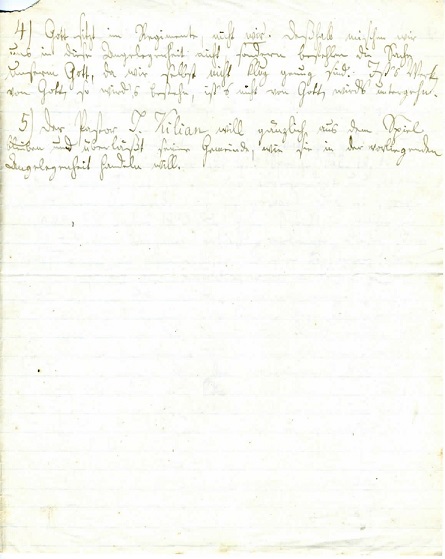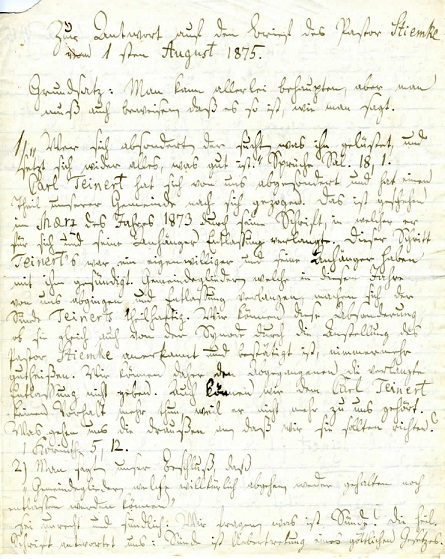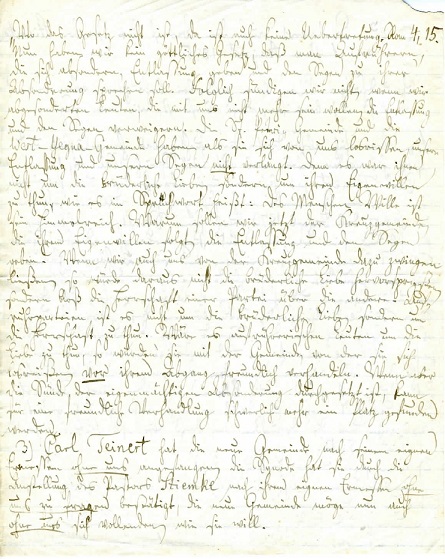Answer to the letter from Pastor Stiemke from August 1st, 1875
Maxim: One can say anything, but one must also prove that what he says is so.
1) “He who separates himself, he seeks what he desires and sets himself against everything that is good.” Proverbs 18:1. Carl Teinert separated
himself from us and took a part of our congregation with him. That happened in March of the year 1873 through a letter in which he demanded release
for himself and his followers. This letter of Teinert’s was willful and his followers sinned with him. The congregational members who left us in these
years and demanded release, made themselves privy to Teinert’s sin. We could never approve this separation, even if it was recognized and confirmed by
the Synod through the appointment of Pastor Stiemke. Therefore we cannot give the demanded release to the people who left. Also we cannot suspend Carl
Teinert, because he no longer belongs to us. “For what have I to do to judge them also that are without?” (1 Corinth. 5:12)
2) It is said that our resolution, that “Congregational members, which depart arbitrarily, are neither kept nor allowed to go” is wrong and sinful. We
ask, what is sin? The Holy Scriptures answers us: Sin is an infraction of God’s Holy law. “Where there is no law, there is no infraction.” Rom. 4:15.
Now we have no law from God, that one should give permission and a blessing on their departure to rebels who leave. Consequently, we do not sin, if we
deny permission and a blessing to those who no longer want to be with us. The St. Peter’s congregation and the West Yegua Congregation did not ask our
permission and blessing, when they tore away from us. For with them, the matter had not to do with brotherly love, but from their self-will. As the
saying goes: A person’s will is his kingdom of heaven. Why should we now give permission and our blessing to the Cross Congregation, who follows their
own will? If we allowed ourselves to be compelled by the Cross Congregation, brotherly love would not sprout out of it, but only power of one party
over another. Parties of insurrection have not to do with brotherly love, but of power. If these rebellious people were concerned about brotherly
love, they would have negotiated their departure from their congregation beforehand in a friendly manner, before they tore away. If the sins of the
arbitrary segregation are asserted, it is difficult to find a place for friendly negotiations.
3) Carl Teinert began a new congregation according to his own discretion, without us; the Synod confirmed it at its own discretion through the hiring
of Pastor Stiemke, without asking us. Therefore the new congregation can complete itself without us, as they like.
4) God rules, not us. Therefore we do not get involved in this matter, but commend it to our God, because we ourselves are not smart enough. If this
act is from God, it will exist; if it is not from God, it will perish.
5) Pastor Jan Kilian wants to remain entirely out of this game, and let his congregation handle this present matter as they like.
[Translated by Barbara Schneider]
[Translator's notes on the Letter to Pastor Stiemke, August 1, 1875
Item 1: The actual quote from Proverbs 18:1 in Luther’s translation has different wording: “Wer sich absondert, der sucht, was ihn gelüstet, und gegen
alles, was gut ist, geht er an”. This suggests either that Pastor Kilian was translating from a Wendish version of Proverbs, or that he was
paraphrasing. The same verse in English is (New Revised Standard Version) “The one who lives alone is self-indulgent, showing contempt for all who
have sound judgement” (but this text contains a note that the meaning of the Hebrew is uncertain); or King James: “Through desire a man, having
separated himself, seeketh and intermeddleth with all wisdom.”
1 Corinth 5:12 in Luther’s translation is “Denn was gehen mich die draussen an, dass ich sie sollte richten?” which is somewhat different from
Kilian’s quote. (King James: “For what have I to do to judge them also that are without?”]
Zur Antwort auf den Brief des Pastor Stiemke vom 1sten August 1875.
Grundsatz: Man kann allerlei behaupten, aber man muss auch beweisen, dass es so ist, wie man sagt.
1) “Wer sich absondert, der sucht, was ihn gelüstet, und setzt sich wider alles, was gut ist.” Sprüche Sal.18,1.
Carl Teinert hat sich von uns abgesondert und hat einen Theil unserer Gemeinde nach sich gezogen. Das ist geschehen
in Marz des Jahres 1873 durch seine Schrift, in welcher er für sich und seine Anhänger Entlassung verlangt. Dieser Schrift
Teinert’s war ein eigenwilliger und seine Anhänger haben mit ihm gesündigt. Gemeindeglieder, welche in diesem Jahre
von uns abgingen und Entlassung verlangen, machen sich der Sünde Teinerts Teilhaftig. Wir können diese Absonderung
ob sie gleich auch von der Synode durch die Austellung des Pastor Stiemke anerkannt und bestätigt ist, nimmermehr
gutheissen. Wir können daher den Abgegangenen die verlangte Entlassung nicht geben. Auch können wir dem Carl Teinert
keinen Vorhalt mehr thun, weil er nicht mehr zu uns gehört. Was gehen uns die draussen an, dass wir sie sollten richten.
1 Korinth 5, 12.
2) Man sagt unser Beschluss, dass “Gemeindeglieder, welche willkürlich abgehan, weder gehalten noch entlassen werden können” Sei unrecht und
sündlich: Wir fragen, was ist Sünde? Die heil. Schrift antwortet uns: Sünde ist Uebertretung eines göttlichen Gesetzes. “Wo das Gesetz nicht ist, da
ist auch keine Uebertretung. Rom 4, 15. Nun haben wir kein göttliches Gesetz, dass man Aufrührern, die sich absondern, Entlassung geben und den Segen
zu ihrer Absonderung sprechen soll. Folglich sündigen wir night, wenn wir Abgesonderten Leuten, die mit uns night mehr sein wollen, die Entlassung
und den Segen verweigern. Die St Petri- Gemeinde und die West-Yegna-Gemeinde haben, als sie sich von uns losrissen, unsere Entlassung und unsern
Segen nicht verlangt. Denn es war ihnen nicht um die Brüderliche Leibe, sondern um ihren Eigenwillen zu thun, wie es im Sprüchwort heisst: des
Menschen Wille ist sein Himmelreich. Warum sollen wir jetzt der Kreuzgemeinde, die ihrem Eigenwillen folgt, die Entlassung und den Segen geben?
Wenn wir auch uns von der Kreuzgemeinde dazu zwingen liessen, so würde daraus nicht die brüderliche Liebe, hervorspriessen, sondern bloss die
Herrschaft einer Partei über die andern. Aufruhrparteien ist es nicht um die brüderliche Liebe, sondern um die Herrschaft zu thun. Wäre es
aufrührerischen Leuten um die Liebe zu thun, so würden sie mit der Gemeinde, von der sie sich losreissen, vor ihrem Abgang freundlich verhandeln.
Wenn aber die Sünde der eigenmächtigen Absonderung durchgesetzt ist, kann für eine freundliche Verhandlung schwerlich mehr ein Platz gefunden
werden.
3) Carl Teinert hat die neue Gemeinde nach seinem eignen Ermessen ohne uns angefangen, die Synode hat sie durch die
Anstellung des Pastors Stiemke nach ihrem eigenen Ermessen ohne uns zu fragen bestätigt, die neue Gemeinde möge nun auch
ohne uns sich vollenden, wie sie will.
4) Gott sitzt im Regimente, nicht wir. Deshalb mischen wir uns in diese Angelegenheit nicht, sondern befehlen die Sache unserm Gott, da wir selbst
nicht klug genug sind. Ist’s Werk von Gott, so wird’s bestehe, ist’s nicht von Gott, wird’s untergehn.
5) Der Pastor J Kilian will gänzlich aus dem Spiel bleiben und überlässt seine Gemeinde, wie sie in der vorliegenden
Angelegenheit handeln will.
[Transliterated by Barbara Schneider]


